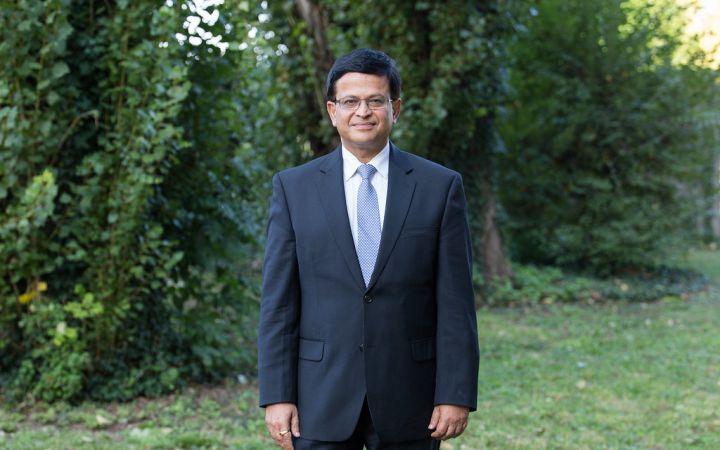July 2020 - Over the next 6-18 months, it is estimated that countries will invest over $20 trillion to recover from the fallout of COVID-19. The make-up of these financial decisions will define the shape of our societies and economies for decades to come, including our ability to respond to greater environmental challenges lying ahead.
In an interview, Mr. Nikhil Seth, the Executive Director of the United Nations Institute for Training and Research (UNITAR), discusses how education and learning can underpin a green economic recovery from COVID-19—as one that cuts CO2 emissions in line with the goals of the Paris Agreement on Climate Change, and promotes sustainable economic activities to achieve the 2030 Agenda for Sustainable Development.
International Monetary Fund (IMF) Managing Director Kristalina Georgieva, and many other leaders, have spoken to the need for a green economic recovery from COVID-19. Why do we need such a recovery?
Tackling the climate crisis—and socio-economic impacts of COVID-19—will require a holistic approach to recovery planning and policymaking. By adopting innovative and green economy policies, countries can pave the way for economic recovery and sustainable jobs based on new and environmentally sensitive business models. At the same time, they can accelerate the structural shift of resource- and carbon-intensive sectors onto greener trajectories, advancing the transition towards a greener and more resilient global economy. However, the success of these measures is contingent on countries also investing in learning. As Nicholas Stern, Joseph Stiglitz, and other renowned economists have recently observed, investment in education and training—to “address immediate unemployment from COVID-19 and structural shifts from decarbonisation”—is a key multiplier for economic recovery and climate action.
What barriers do countries face in implementing a green economic recovery from COVID-19, and how can education and training help to overcome these?
One major practical challenge to implementing a green recovery lies in ensuring that countries are equipped with the knowledge and skills to do so. While there is an established rulebook available to governments to drive conventional recovery, that is not the case for the type of recovery we need at this point in time. Building the capacities and skills base of policymakers and relevant stakeholders is therefore central to success, and here the Partnership for Action on Green Economy’s (PAGE) “Learning for a Green Recovery” initiative could not be more timely. UNITAR, in collaboration with other UN agencies, is set to launch a package of free-of-charge, e-Learning courses that address policy issues central to the green recovery debate, including green economy, fiscal reform, trade, green industrial policy, green indicators, and sustainable finance. All courses are now available on UNITAR’s flagship UN CC:e-Learn platform, which has attracted a growing number of users throughout the COVID-19 crisis—showing that e-courses represent an increasingly vital learning tool.
How can educational and learning tools also ensure that a green economic recovery from COVID-19 has the necessary public support?
Policymaking rarely relies on reason and scientific evidence alone. Implementing a green recovery—which will have so many far-reaching impacts—will not be possible without a groundswell of public support. We have a number of reasons to be optimistic in this regard. While the ‘Green New Deal’ did not initially take off following the 2008 financial crisis, it has now become a staple of policy discourse in Europe and other regions. At the same time, schoolchildren across the world have given a new voice—and added fresh impetus—to the climate debate. We may now be turning an important corner, and in a recent survey conducted by IPSOS among more than 28,000 adults worldwide, more than 65% agreed that as countries respond to COVID-19, it is “important that government actions prioritize climate change.” New educational and learning tools such as podcasts and microlearning—which reach a broader audience and can therefore nudge debate and advocacy beyond typical policy circles—can tap into this groundswell to catalyze increased public demand for green action.
As well as building public support for a green economic recovery today, how can these new learning and training approaches sustain the momentum towards a green recovery over time?
Implementing a green recovery, and meeting global climate and development goals under the Paris Agreement on Climate Change and 2030 Agenda for Sustainable Development, will not happen overnight. So, while e-courses, podcasts, and microlearning are important tools for advancing a green recovery today, we must also work to build the next generation of leaders and change agents needed to sustain green, structural change tomorrow. Methods to institutionalize in-country learning and training are therefore equally important, and PAGE’s new course on Green Industrial Policyprovides a good example in this respect. As well as being the first PAGE course to feature a podcast series as part of its learning components, the course’s unique structure—with multimedia content tailored for integration into existing instructional activities—has been designed to support universities and training institutions in advancing learning on green industrial policy at a high technical level. This approach will become increasingly important if we are to equip our future leaders with the knowledge and practical skills needed to tackle the greater environmental challenges lying ahead.
PAGE’s new course on Green Industrial Policy: Promoting Competitiveness and Structural Transformation, forms part of PAGE’s “Learning for a Green Recovery” initiative. The course, and others in this new series, can be taken online at UNITAR’s flagship UN CC:e-Learn platform, which now has more than 300,000 users worldwide.


